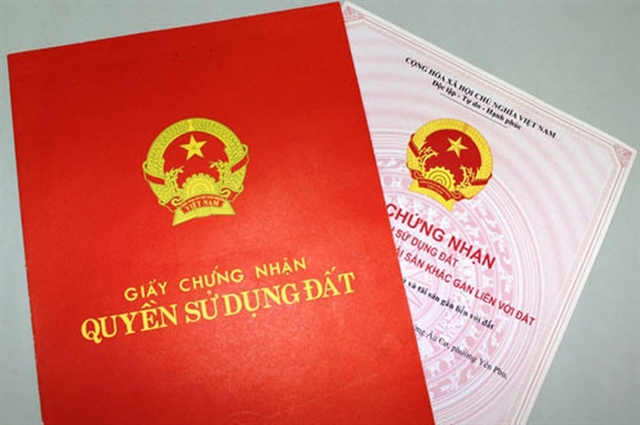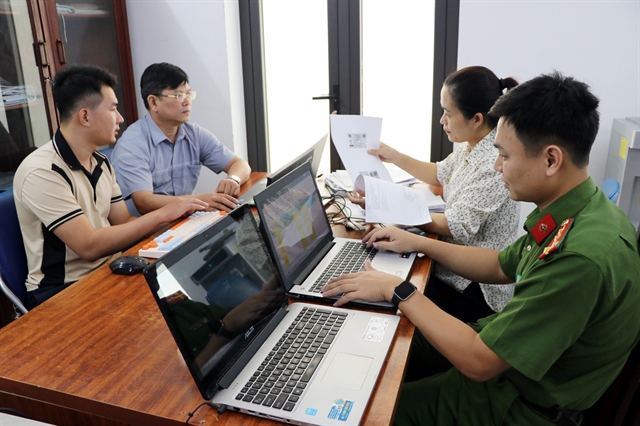 Politics & Law
Politics & Law

 |
| The land use rights certificate, also known locally as the ‘red book’. Photo courtesy of the Việt Nam Government Portal |
Collecting accurate data has become a crucial step in the 90-day campaign to improve the national land database, currently implemented nationwide by the Ministry of Agriculture and Environment (MAE) and the Ministry of Public Security (MPS) in coordination with local authorities.
Running from September 1 to November 30, the campaign serves as a test of the data governance capacity for the public administration system – focusing on building compatible, accurate and shareable electronic records among state agencies.
According to the plan, the campaign covers four main areas: completing the existing land database; building new land and housing datasets in areas lacking them; synchronising, connecting and sharing land information nationwide; and offering online public services linked to land lot identification codes and national digital addresses.
Collecting copies of land use rights certificates, also known locally as "red books", is intended to support data review, cross-checking and cleansing. Citizens are only required to provide photocopies of their certificate and ID card when requested by the working group, without needing notarisation.
The goal is to integrate the red books into the VNeID application so that people can self-declare and verify information.
However, people have raised concerns that the requirement to submit photocopies of these documents may contradict the Government’s policy on implementing administrative procedures under the one-stop-shop mechanism.
In some localities, the implementation process has shown bureaucratic tendencies. Thu, a resident in Vĩnh Tuy Ward in Hà Nội, who gave only her first name, said she recently received a notice requesting her to submit a photocopy or photo of her land use rights certificate and ID card.
“The certificate and ID card are both issued by state agencies, and the data has been stored in the state management system," she said, questioning: "So why ask people to submit copies? If our personal information and assets are leaked, who will be held responsible?”
Data cleansing efforts
National Assembly (NA) deputies consider this 90-day campaign to “clean and enrich” land data as a rightful step, reflecting the Government's strong commitment to the national digital transformation process.
The national land database, one of the six fundamental datasets supporting e-Government operation, is expected to contribute to a cohesive and transparent land data system that better serves people and businesses.
However, the policymakers noted that the implementation process should minimise bureaucracy and inconvenience for the people.
 |
| Public officials in Hải Phòng City update the local land database. VNA/VNS Photo Mạnh Tú |
Recognising the importance of the campaign, NA deputy Nguyễn Thị Việt Nga of Hải Phòng City said that the issue lay in the way it was being carried out in several localities.
“When authorities require photocopies of the land use rights certificates – documents already issued and archived by state agencies – it not only causes trouble and wastes time for people but also shows a misalignment with the digital transformation approach,” she said.
According to Nga, the purpose of digital transformation is that data must be shared, connected and reused within the state management system, not “shifting the administrative burden from the state to the people”.
When people have to print, photocopy or notarise documents that the authorities already possess, the spirit of “putting people at the centre” of administrative reform and digital transformation is undermined, she said.
Avoiding redundancy
In principle, the authorities hold and manage all original land records, both in paper and electronic form. If the data is not compatible, the correct solution must be to review, standardise and consolidate the available data between departments rather than asking people to provide photocopies.
Requiring citizens to provide information should only be applied in cases where there is a lack of data or there are signs of errors that need to be verified.
The Hải Phòng deputy also noted that the Government had clearly directed that all data cleansing activities must use technology, ensuring safety, security, and avoiding unnecessary procedures for people.
"Therefore, reviews and adjustments are necessary if any locality still performs technical tasks manually and bureaucratically," she said.
From a broader perspective, this campaign should be viewed as a test of systemic capacity, Nga said, explaining that modern governance could not rely on paper but on compatible, accurate and shareable electronic data among state management agencies.
When data cleansing is carried out properly, people will not need to carry stacks of documents for every administrative procedure, and state agencies will reduce costs, manpower and errors. Therefore, for the campaign to meet its practical goals, Nga believes any document requests need to be carefully assessed to avoid creating extra procedures contrary to the spirit of reforms.
“Only then, after 90 days, will we not only have a cleaner land database but, more importantly, a digitalised, efficient and people-friendly administrative apparatus,” she said.
NA deputy Phạm Văn Hòa of Đồng Tháp Province agreed that multiple shortcomings remained in land management, especially in data standardisation.
Instead of letting people print, photocopy and notarise documents that are time-consuming and risk losing important papers, he said management agencies should utilise, cross-check and make updates based on existing archived records.
This method might lead to minor errors, but differences should be insignificant and would decrease once the data system is fully established.
Collaborative approach
Responding to the concerns, Mai Văn Phấn, deputy director of the MAE’s Department of Land Administration, said: “This is not an administrative procedure but rather a collaborative effort to complete the national land database, facilitating land-related procedures and creating favourable conditions for people and businesses.”
The campaign requires land users and property owners to participate in providing and verifying information. This is an important step toward completing the national land database and enhancing online public services in the digital environment.
However, Phấn acknowledged that several localities still lacked specific guidance, causing confusion among people during implementation.
To address the shortcomings, the MAE’s Department of Land Administration is working with the MPS's Department of Administrative Police for Social Order to build a new feature in the VNeID app, allowing people to declare their land use rights certificates digitally instead of submitting physical photocopies.
Regarding the reason for collecting photocopies of red books, Phấn explained that the registration and issuance of certificates had undergone many changes and regulations over the years. Some older documents only recorded the name of the household head, lacked ID number, or were based on temporary maps.
The same situation was seen with the national ID cards, which changed from nine-digit to 10-digit, and now to the 12-digit chip-based version.
In many cases, land users transferred, subdivided, or changed the purpose of land use, or had not completed inheritance procedures, leading to inconsistent data. Meanwhile, natural disasters such as landslides and floods had damaged records in several localities, making verification more difficult. VNS




